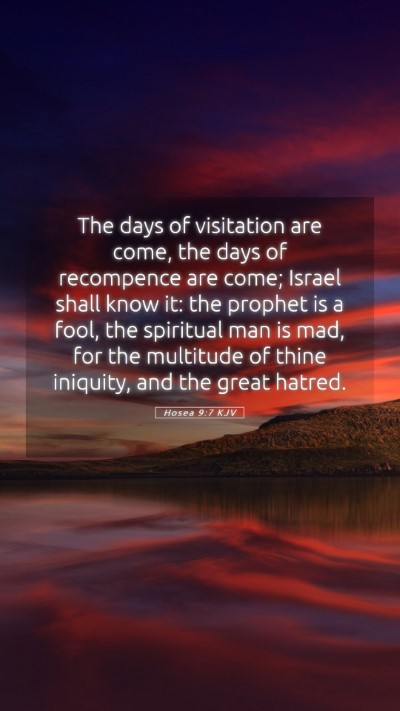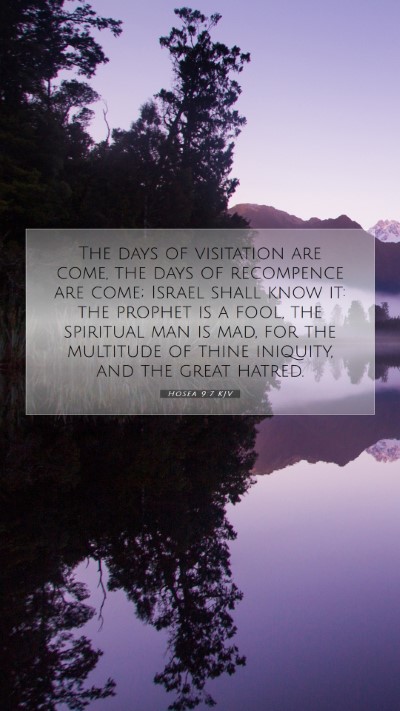Old Testament
Genesis Exodus Leviticus Numbers Deuteronomy Joshua Judges Ruth 1 Samuel 2 Samuel 1 Kings 2 Kings 1 Chronicles 2 Chronicles Ezra Nehemiah Esther Job Psalms Proverbs Ecclesiastes Song of Solomon Isaiah Jeremiah Lamentations Ezekiel Daniel Hosea Joel Amos Obadiah Jonah Micah Nahum Habakkuk Zephaniah Haggai Zechariah MalachiHosea 9:7 Meaning
What is the meaning of Hosea 9:7?
The days of visitation are come, the days of recompence are come; Israel shall know it: the prophet is a fool, the spiritual man is mad, for the multitude of thine iniquity, and the great hatred.
Hosea 9:7 Bible Verse Meaning
Bible Verse Meaning: Hosea 9:7
Scripture Reference: Hosea 9:7 states, "The days of visitation are come, the days of recompence are come; Israel shall know it: the prophet is a fool, the spiritual man is mad, for the multitude of thine iniquity, and the great hatred." This verse signifies a period of judgment and consequences for Israel's disobedience.
Bible Verse Explanations
In Hosea 9:7, the prophet Hosea conveys a message of impending judgment against the people of Israel. This reflection on Israel's spiritual state and the role of the prophet enables readers to gain a profound understanding of the context surrounding Hosea's message.
Key Themes in Hosea 9:7
- Days of Visitation: This phrase marks a time when God intervenes in human affairs, often through judgment.
- Recompense: It indicates the reaping of consequences from actions, emphasizing God’s justice.
- Rejection of Prophets: The verse highlights how people often dismiss the messages of God’s messengers, seeing them as foolish.
- Spiritual Madness: Reflecting on the madness of a nation that turns away from divine wisdom in favor of iniquity.
Commentary Insights
Matthew Henry’s Commentary: Henry posits that Hosea describes the profound consequences of Israel’s sins and the derision of their prophets. The "days of visitation" imply that divine judgment has arrived, leading to a correction of the errant nation.
Albert Barnes’ Exposition: Barnes explains that the people of Israel would soon realize the severity of their situation, emphasizing the role of the prophets as underappreciated and sometimes grievously misunderstood. He points out that the prophetic message is met with contempt during times of judgment.
Adam Clarke’s Commentary: Clarke highlights the prophetic role and the nature of Israel's spiritual state. He discusses how spiritual blindness resulted in viewing divine truth as folly, underscoring the tragedy of rejecting divine guidance and succumbing to iniquity.
Understanding Scripture through Hosea 9:7
The context of Hosea reflects the broader themes of judgment, repentance, and God’s faithfulness to a wayward people. It serves as a reminder to study and reflect upon our spiritual lives and the implications of our actions. This passage particularly highlights:
- The Importance of Prophetic Voices: Reminds us to heed warnings from Scripture and not dismiss them.
- Consequences of Sin: Encourages readers to consider the long-term outcomes of disobedience and iniquity.
- Hope amid Judgment: Though dire, the prophetic warnings also point towards the possibility of repentance and restoration.
Applying Hosea 9:7 to Daily Life
This verse serves as a powerful call to self-examination. Believers are encouraged to contemplate the following:
- How do we respond to God’s messages today? Are we open to His correction?
- What steps can be taken to avoid spiritual blindness and madness in our own lives?
- How can we support others in recognizing the importance of heeding spiritual guidance?
Bible Verse Commentary and Cross References
For further study on this theme of judgment, recompense, and the role of prophets, consider the following Bible cross-references:
- Jeremiah 7:25-26: Discusses Israel's historical rejection of prophets.
- Isaiah 30:10: Described as those who refuse to hear the words of God.
- Ezekiel 3:17: Highlights the responsibility of a watchman to warn the wicked.
- Amos 5:10: Critiques those who abhor the words of God’s prophets.
- Micah 3:5: Condemns false prophets who lead people astray.
- 1 Thessalonians 5:20-21: Encourages believers not to despise prophecy but to test all things.
Conclusion
Hosea 9:7 serves as a poignant reminder of the consequences of turning away from God and dismissing His messengers. By examining this verse through various commentaries, believers gain deeper bible verse understanding and insights that apply to their spiritual journeys. Regular Bible study on such passages can enhance one's spiritual life and foster a more profound commitment to understanding and applying Scripture.
Engaging in online Bible study groups or utilizing Bible study tools can further aid individuals in exploring difficult passages, enriching their Bible verse interpretations, and developing a deeper connection with the Word of God.


